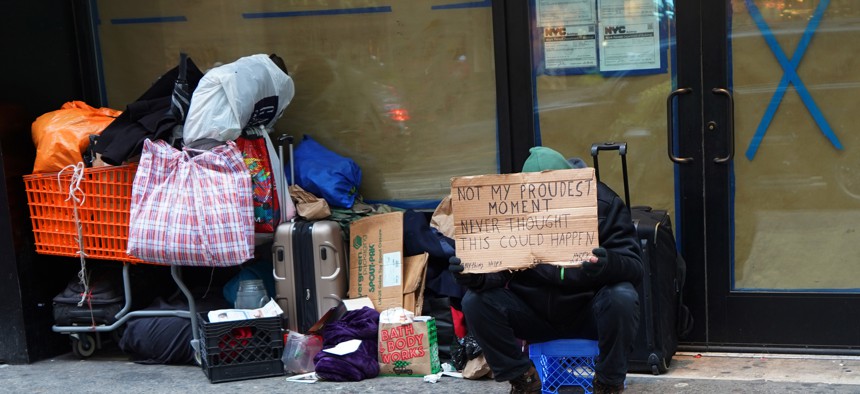De Blasio announces more safe haven beds, affordable homes for street homeless

Homeless man sits on the street with a sign and belongings stacked on a shopping cart. Shutterstock
Amid recent criticism that New York City has focused too much of its energy on outreach over increasing housing resources, Mayor Bill de Blasio on Tuesday announced a new plan to end street homelessness within five years, Politico reports.
One piece of the initiative involves opening 1,000 new safe haven beds, which offer fewer barriers to entry and fewer restrictions for residents than traditional shelters. The mayor highlighted faith-based organizations such as the Archdiocese of New York, as well as nonprofit providers, as important partners in accomplishing that goal. The approximately $100 million plan also includes creating 1,000 new affordable apartments, offering rental assistance vouchers to the chronically homeless, and expanding the city’s health outreach program to all five boroughs.
Homelessness advocates praised the initiative, which comes after reports indicated that the city would also move forward a bill backed by advocates that would mandate affordable housing projects set aside 15% of their units for the homeless. It represents a shift they have long pushed for – focusing on increasing affordable housing – but concerns linger.
Josh Dean, director of the advocacy group Human.nyc, told The City the initiative was great news – if people can easily be connected to housing and the city can create beds quickly – which, historically, has been a challenge. And Giselle Routhier, policy director for Coalition for the Homeless, also criticized one portion of the plan that would expand the use of NYPD officers in conducting outreach to homeless people in the subway system.
“We urge the Mayor to shift the focus of engagement from NYPD officers to trained social services professionals in all interactions with homeless individuals, and to further build upon these initial investments in housing and safe havens,” she said in a statement.
